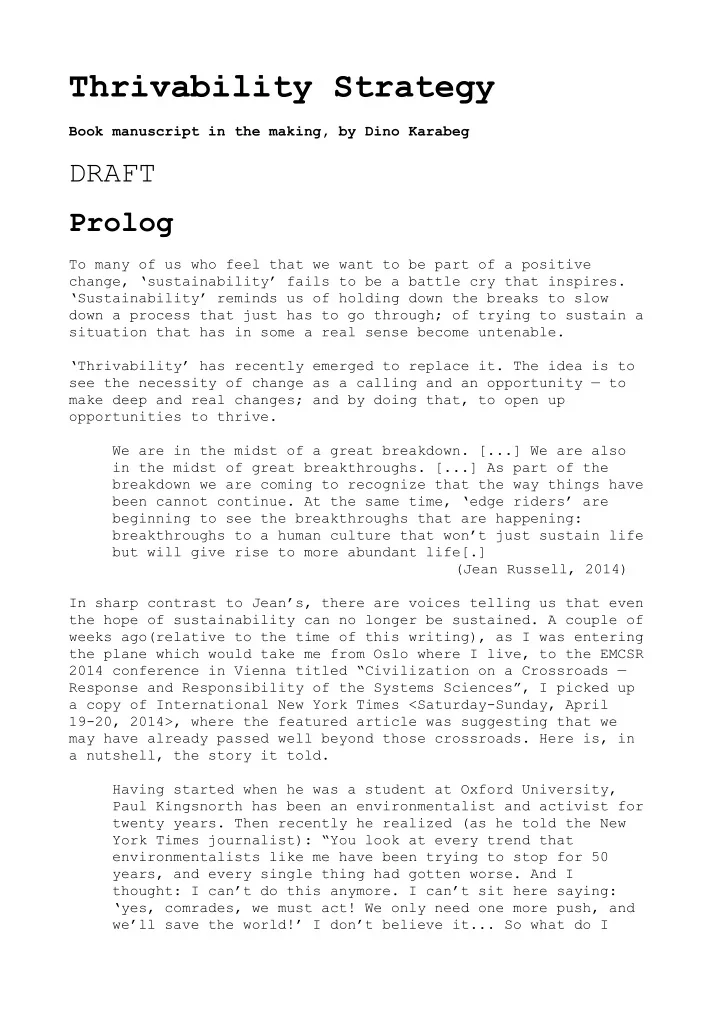

Thrivability Strategy Book manuscript in the making, by Dino Karabeg DRAFT Prolog To many of us who feel that we want to be part of a positive change, ‘sustainability’ fails to be a battle cry that inspires. ‘Sustainability’ reminds us of holding down the breaks to slow down a process that just has to go through; of trying to sustain a situation that has in some a real sense become untenable. ‘Thrivability’ has recently emerged to replace it. The idea is to see the necessity of change as a calling and an opportunity — to make deep and real changes; and by doing that, to open up opportunities to thrive. We are in the midst of a great breakdown. [...] We are also in the midst of great breakthroughs. [...] As part of the breakdown we are coming to recognize that the way things have been cannot continue. At the same time, ‘edge riders’ are beginning to see the breakthroughs that are happening: breakthroughs to a human culture that won’t just sustain life but will give rise to more abundant life[.] (Jean Russell, 2014) In sharp contrast to Jean’s, there are voices telling us that even the hope of sustainability can no longer be sustained. A couple of weeks ago(relative to the time of this writing), as I was entering the plane which would take me from Oslo where I live, to the EMCSR 2014 conference in Vienna titled “Civilization on a Crossroads — Response and Responsibility of the Systems Sciences”, I picked up a copy of International New York Times <Saturday-Sunday, April 19-20, 2014>, where the featured article was suggesting that we may have already passed well beyond those crossroads. Here is, in a nutshell, the story it told. Having started when he was a student at Oxford University, Paul Kingsnorth has been an environmentalist and activist for twenty years. Then recently he realized (as he told the New York Times journalist): “You look at every trend that environmentalists like me have been trying to stop for 50 years, and every single thing had gotten worse. And I thought: I can’t do this anymore. I can’t sit here saying: ‘yes, comrades, we must act! We only need one more push, and we’ll save the world!’ I don’t believe it... So what do I
do?” Kingsnorth drafted a manifesto nicknamed ‘Uncivilization’. “There is a fall coming,” it announced. “After a quarter-century of complacency, in which we were invited to believe in bubbles that would never burst, prices that would never fall... Hubris has been introduced to Nemesis.” Other people who felt similarly joined him. The mission of the Dark Mountain Project, which is now growing around Kingsnorth, is to help people come to terms with this fact. Is universal thriving still possible? Or is it only something we have invented to make us feel better — while waiting for an impending disaster? And if thriving indeed can be reached, can we rely on getting there by simply trusting the breakthroughs that are already happening? Or do we need to see our situation in a new way, and consciously make a turn? And if a concerted turn is needed, in what direction should it be? What can we do — realistically — to make sure that we have done our share, so that the good fortune may do the rest? My purpose in writing is to tease out a clear, practical and dependable answer. And indeed a bit more than that. It will turn out that a clear answer about what needs to be done has been seen and given, already in the 1960s, by Erich Jantsch, Douglas Engelbart, and several other visionary researchers and inventors. All I need to do now is to tell their story; let them speak. What will be new, however, is that their recommendations will not only be retold; they will also be followed! As you will be becoming better acquainted with their way of seeing and acting, you will be witnessing the turn they recommended already being made — through real-world events; including the events at and around the EMCSR conference in Austria; and even through this book, which is intended to be a move in the same development. You will be witnessing opportunities for contribution and achievement — academic, entrepreneurial, technological, environmental... — opening up, on a frontier where our ambitions and our criteria for success are becoming aligned with the specific nature of our condition; and with the exigencies of this new phase in our societal and cultural evolution. In this way my “dependable answer” about the way to universal thriving will not need to depend on guessing the future (as you may be sensing, it is uncertain). Rather, the good tidings about thriving I want to bring you will will be similar in spirit as the news about enlightenment that Zen Master Dogen brought with him from China to Japan centuries ago: We do not need to strive and
wait for many generations to experience it! Universal thriving is alive and well in our midst here and now — as an evolutionary direction; and as an experience. You can join it — and experience it — already today! Opening up this opportunity — in a clear, practical and dependable way — is what this book is about.
Recommend
More recommend